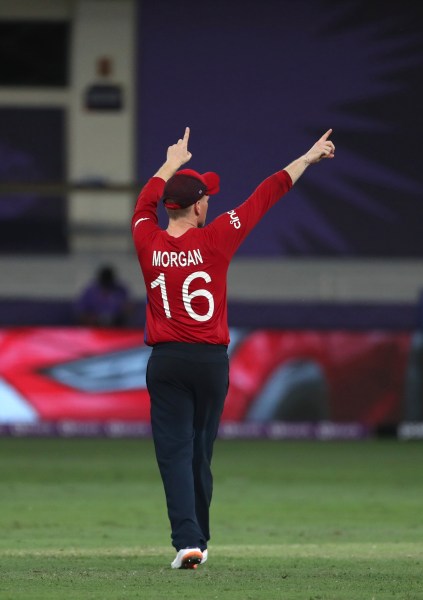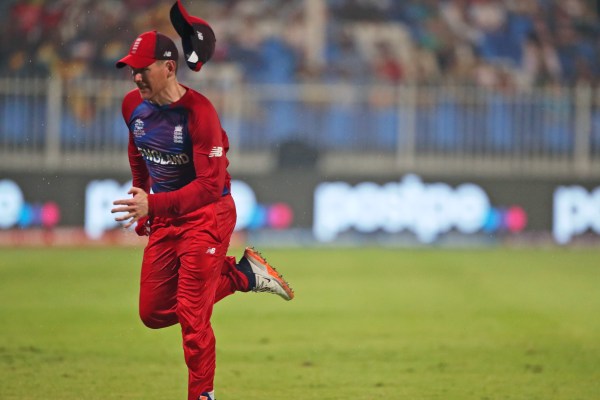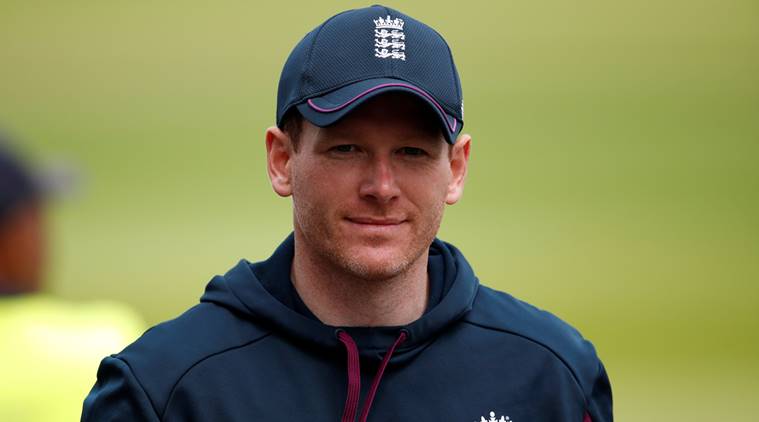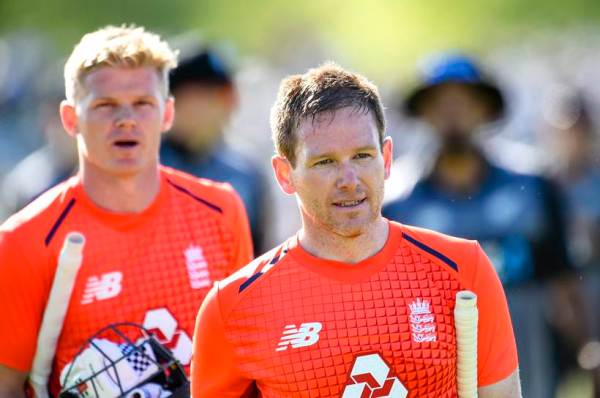
[ad_1]
“If you don’t believe, nobody else will”. It sounds like a dated line from a self-help book. The Seven Secrets of Successful People or New Year, New You type. Or a gem from Zig Ziglar, the self-styled master of motivational speaking. But this was Eoin Morgan, breathing confidence in overturning his prolonged batting slump after the game against Sri Lanka in the T20 World Cup.
The line indeed could have been from a self-help book or a podcast on leadership Morgan was hooked to the night before. He is an avid student of leadership, eternally looking out for new lessons from different realms of life. Restricted to his Middlesex home at the peak of the pandemic, he tuned into the Masterchef programme, partially to learn cooking as well as to observe how leadership works in the culinary world. He soon flipped onto Garry Kasparov’s Masterclass to acquaint with a game often compared to cricket in its emphasis on strategies, tactics, and manoeuvres. Opening, defence, gambit, end game—chess-speak and cricket-speak have dictional bonding.
He tunes into the podcast of Dave Novak, a former chief executive of Yum! Brands, the owners of KFC and Pizza Hut. The famous lines of American golfer Jack Nicklaus—“Do what you want to do, not what others want you to do. Give everything you have got. Be prepared for what you are doing”—is the guiding principle tattooed on his consciousness, he once told The Daily Telegraph. It’s his coping mechanism, he tells Mike Atherton in a podcast, in soaking the pressures of being a leader, batsman and person.
The multiple roles he juggles, distinct but indistinct, are often intertwined, but Morgan demarcates with a coroner’s detachment. The downswing of his batting has not hampered the upswing of his captaincy. “I’ve always managed to treat them as two different challenges. You get two bites at the cherry impacting the game.”
 England’s Eoin Morgan in action in the T20 World Cup. (Reuters)
England’s Eoin Morgan in action in the T20 World Cup. (Reuters)
Whereas his batting has looked laboured and torturous, he has taken to the tactical chessboard that is the World Cup with the relish of a magisterial grandmaster. One of them has already acquired cult status in the manual of tactical masterstrokes. The gumption to open the bowling with leg-spinner Adil Rashid against Australia. David Warner and Aaron Finch were expecting pace, medium pace or Moeen Ali’s off-break, more so as Warner was left-handed. Australians were taken aback, and carried the shivers of panic throughout the innings, even though Rashid’s first over was unremarkable. The logic behind the decision was Finch’s superior record against off-spinners.
Ironically, Rashid was the last bowler he summoned against West Indies. It was part of another masterplan—the susceptibility of Andre Russell and Kieron Pollard against leg-spin. In that game, Moeen Ali was unleashed in the power-play because West Indies’s top-order was left-hand heavy. Change-of-pace expert Tymal Mills was preserved for just Pollard, for he tends to struggle against left-arm seamers. Against Sri Lanka, he kept mixing his bowlers in the power-play—Moeen, Rashid, Chris Jordan and Chris Woakes were used—so that they don’t get used to a particular brand of bowling. Rashid was used as bait, considering Sri Lanka’s penchant for attacking the spinners. It worked.
Evident was a chess grandmaster-like intuition of envisioning several moves ahead. It’s not always about thinking out of the box or pulling a rabbit out of the hat, but executing the correct strategy at the correct time too. That superior acumen to process a situation, or a would-be situation in isolation, in the split of a second and to derive the best solution. His former batting coach, with both England and Middlesex, Toby Radford had discovered this streak more than a decade and a half ago.
 England’s captain Eoin Morgan shakes hands with members of the West Indies team after the end of the Cricket T20 World Cup match between England and the West Indies at the Dubai International Cricket Stadium, in Dubai, UAE, Saturday, Oct. 23, 2021. England won the game by 6 wickets. (AP Photo/Aijaz Rahi)
England’s captain Eoin Morgan shakes hands with members of the West Indies team after the end of the Cricket T20 World Cup match between England and the West Indies at the Dubai International Cricket Stadium, in Dubai, UAE, Saturday, Oct. 23, 2021. England won the game by 6 wickets. (AP Photo/Aijaz Rahi)
It had little to do with leading a team, but in the clarity he showed when batting in a crisis. “We were crumbling on a turner against Somerset. Then Eoin comes and straightaway started batting fluently. He played the perfect shot for the perfect ball when the ball was turning square. There was no risk, no confusion, in his mind he was clear about everything. We were like, wow we have an 18-year-old batting like a 25-year-old. That innings convinced many of us that he would not just be a great batsman but a great leader too because both batting and captaincy are about taking the right decisions at the right time.” he says. For England, he has been more than a template-setting batsman or a World Cup-winning captain. But a white-ball philosopher, who had build the team in his ideals.
*********
A few days before the Middlesex-Kent game in 2009, regular skipper Shaun Udal got injured. The team had a raft of wizened cricketers like Chris Silverwood, Murali Kartik, Nick Compton and Owais Shah, but the team management decided to thrust captaincy on Morgan, who was then only 22, and just two months after his last match for the country of his birth. It didn’t surprise anyone who knew Morgan: “I was looking after the junior side, but when he heard the news, none of us was shocked, because we always knew he would be an excellent leader,” says Radford.
Flickers of an ingenious leader sparkled often. “Little things how he organised himself, how he went about his practice sessions, how he interacted with coaches and teammates, there was always professionalism about it. He was always serious about the stuff he did, and was always willing to listen. And of course, very driven,” he says.
When encountering trouble, he had a robotic, cold-eye tunnel vision, to process the situations and choose the best solution. “A kind of foresight,” the coach says.
 England’s captain Eoin Morgan gestures to place the fielders during the Cricket Twenty20 World Cup match against Australia in Dubai, UAE, Saturday, Oct. 30, 2021. (AP Photo/Aijaz Rahi)
England’s captain Eoin Morgan gestures to place the fielders during the Cricket Twenty20 World Cup match against Australia in Dubai, UAE, Saturday, Oct. 30, 2021. (AP Photo/Aijaz Rahi)On the field, his brain always kept ticking. “He was really fond of the analytical and tactical side of things, getting to know the scientific aspects,” he adds. He though was not an over-eager youngster, who would pester the captain with redundant ideas, but a measured youngster who went up to the captain only when an idea genuinely struck him. “There was no pretence about him,” he says. He is what he is.
To Morgan. captaincy is a responsibility he feels intensely, and personally. He thinks, a lot, about what it is to be a captain, about his own needs and those of his team, about the people management side and the human resources side and the psychologist side, about what sort of captain he wants to be.
In that game, Middlesex beat Kent by 47 runs and Morgan won praise for his harnessing of bowlers and field placement, both distinctive characteristics of his leadership styles in the later years. Both Moeen Ali and Adil Rashid would vouch for that. At different junctures, their careers have flat-lined, but Morgan, understanding their craft and the paucity of spinners in England, ensured that they didn’t slide away. There is an instructive stat in measuring the centrality of Rashid in England’s one-day scheme. Before him, no England leg spinner had taken more than five wickets in T20 or ODI cricket combined. Rashid has 231 to his name, of which 199 have arrived with Morgan at the helm.
No better appraisal of his man-management skills than Moeen calling him the best captain he has played under. “As a spinner you need backing and the biggest thing is if you do get hit for a couple of fours, the captain does not take his cap off, throw it down on the floor and kick it. You need the captain to say ‘come back the next over’ and Morgy does that,” he told The Telegraph.
Similarly, he channels the best out of Rashid, who he briefed not to worry about leaking runs in exchange for wickets. “When I came back in (to the team), he kept it very simple for me, which was very good. He told me what my job in the team is – ‘what we expect from you is try to create chances’. He understands that there are going to be games where you don’t go well, and has the confidence that I would perform in the next game. That makes him the best captain I have played under,” he explained the reason behind his white-ball resurgence.
Moeen and Rashid are just examples. Most of the players and support staff would vouch for Morgan’s leadership, the bond and trust manifesting in a close-knit, likeable, and most importantly a winning, English side.
*****
It’s an often-repeated story in England cricket but is worth another recounting for the light it throws on Morgan’s psyche. In 2015, just before the transformative, philosophy-setting series against New Zealand, then director of the cricket board Andrew Strauss had lingered on in the room after his speech, which was “intimidating the players.” So he politely asked him to leave the room so that they could continue with the team meeting.
“So while he was talking, I was thinking, you know, he’s a hero of mine. And then when he stopped, and I started, we wanted to talk as a team. But nobody started to say anything. And I turned around, and he was still there. So I sort of was thinking, well, nobody’s gonna say anything while you know, one, the boss is here and two he is an iconic player. So I politely showed him the door. And we continue there, our meeting,” he explained in a Sky Sports podcast.
 Eoin Morgan in an attempt to save a boundary during the Cricket Twenty20 World Cup match between England and Sri Lanka in Sharjah, UAE, Monday, Nov. 1, 2021. (AP Photo/Aijaz Rahi)
Eoin Morgan in an attempt to save a boundary during the Cricket Twenty20 World Cup match between England and Sri Lanka in Sharjah, UAE, Monday, Nov. 1, 2021. (AP Photo/Aijaz Rahi)
The incident illustrates multiple layers of his persona. One, he reads the mind of the players, and in making them feel comfortable he wouldn’t mind ushering the boss out of the room. Second, it demonstrated his courage, a trait that is the polestar of his English team. He and Strauss go back to their Middlesex days, he was picked in England squad for the first time in his tenure, was made captain under his supervision, he keeps referring to the debt of gratitude he owes Strauss, but to tell the boss to leave the room, screams of his ability to draw the line between personal and professional lives.
Third, he gets what he wants, be it freedom, licence, or personnel. He is persuasive that way, in that he could persuade the board to preserve cross-format players for white-ball cricket, even at the expense of missing important Test series. Like Moeen Ali, who was flown back to England in the middle of a Test series in India so that he is fresh for white-ball leg. He gets a full-strength for that series while his best friend and Test captain Joe Root had to manoeuvre with a largely second string.
 To Morgan. captaincy is a responsibility he feels intensely, and personally. (Reuters/Andrew Boyers)
To Morgan. captaincy is a responsibility he feels intensely, and personally. (Reuters/Andrew Boyers)
It’s another trait coaches detected when he was barely in his teens. His childhood coach Brian O’Rourke says: “If he had a vision, no one was going to get in the way of it.” Like his vision to play for England, which he conveyed to junior coach Adrian Birrell when he was just 13. Like his vision to embolden English cricket, even if it meant losing games for achieving their vision. The former director of Middlesex Angus Fraser once summed this perfectly to The Guardian: “He’s very clear about what he wants, what he likes and doesn’t like. He’s not interested in winning you over, and he’s not worried whether you like him or not.”
Unsurprisingly, he’s not reluctant to take a stand. There is no dilly-dallying or half-measures. He firmly stood by his decision to not travel to Bangladesh after a terror strike in 2016, though it many in the board livid, including Strauss. He firmly stood by his decision to not reintegrate Alex Hales after he was found to have used recreational drugs.
Behind the fiercely-lit torch of ambition is a lurking fear of failure, to be not like the stereotypical futilely firebrand tragic Irish hero. The Leopold Bloom and Stephen Dedalus of James Joyce’s novels. Morgan explains this in a short documentary on his life, No Boundaries: “Growing up in Ireland, being such a small community, there’s always a story somewhere in a town or village locally where people haven’t quite made it or there’s an excuse, they haven’t given themselves the best shot or they found it difficult being away from home.” He didn’t want to be that, and in the single-minded pursuit of that, he lived by the lodestar: “If you don’t believe, nobody else will”. The words are not from a management book but from Morgan’s diary of evolution.
******
The gift of Morgan that Rashid likes the most is his emotions, or how he shackles them. “He shows very little emotions. If things are not going well with a team or a bowler or a batsman, you never see him down or throwing his hands around. And vice-versa, if things are going very well, you won’t see him very excited. He is very level-headed. That’s what definitely stands out with him as a captain, as a leader,” he once said.
The concurrence would arrive in a few minutes of watching Morgan on the field. Morgan is everywhere, yet nowhere. He could be spotted talking to a bowler in a non-plussed, nor-urgent manner before an over, he rarely intrudes them between deliveries. Setting fields are a meditational and not an argumentative chore. Sometimes, he just jogs up to the bowler and stands without uttering a word. Nothing cajoles emotions—not a loose ball, not a boundary, not a dropped catch, not an umpiring howler. One of the character-defining images of his career is Morgan walking past devastated England cricketers scattered, as if etherised, in the agony of the defeat in the T20 World Cup final in 2016 to congratulate the victorious West Indies team, without a splotch of anger fluttering on his face.
 It’s not always about thinking out of the box or pulling a rabbit out of the hat, but executing the correct strategy at the correct time too. (FILE)
It’s not always about thinking out of the box or pulling a rabbit out of the hat, but executing the correct strategy at the correct time too. (FILE)
It’s part of being true to oneself, Morgan tells Atherton. And strikes a Virat Kohli parallel. “He’s driven emotionally and outwardly very passionate. So him continuing to captain like that is probably getting the best out of him and the team. Me trying to act like Virat would not get the best out of myself.”
In that sense, he has asserted that aggression needn’t be a macho outpouring of emotions, but aggression could be more layered and soft-edged, less violent and volatile. That perhaps could be termed Morganism—fearless yet calm, attached but detached, passionate yet dispassionate.
[ad_2]
Source link